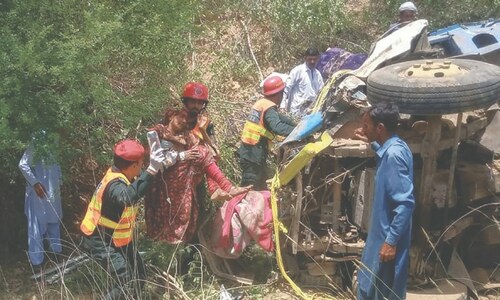ISLAMABAD: Prime Minister Nawaz Sharif on Friday met his national security team for the third time this month to discuss the security situation in tribal areas.
Chief of Army Staff General Raheel Sharif, Inter-Services Intelligence Director General Lt Gen Zaheerul Islam and Chief of General Staff Lt Gen Ashfaq Nadeem attended the meeting held at the Prime Minister’s House.
Interior Minister Chaudhry Nisar Ali Khan and senior members of the prime minister’s staff were also in attendance.
Gen Sharif, speaking at the Command and Staff College in Quetta earlier in the day, had said that the army was ready “to deter and defeat any aggression across the entire threat spectrum”.
The meeting comes a day after a schism emerged in the outlawed Tehreek-i-Taliban Pakistan (TTP), with a Mehsud faction opting out of the militant alliance and the same day as a decision by the North Waziristan-based Gul Bahadur group to end its peace deal with the military.
Sources in the PM’s Office said the meeting considered different options to deal with the situation developing in the Federally Administered Tribal Areas (Fata).
On a visit to South Waziristan earlier this week, Gen Sharif had said that the “misplaced ideology of the terrorists” had been rejected and stressed the need to rid the country of the menace of terrorism in order to ensure progress.
National security meetings have now become the central forum for decisions on security-related matters.
Last week’s aerial strikes against militant hideouts around Miramshah, the deadliest in a series of similar attacks carried out by the armed forces over the past few months, came after a similar meeting on May 20.
Following the strikes, the media was rife with speculation on whether or not the action was approved by the civilian leadership in the May 20 meeting.
Both civilian and military leaders had clarified the situation. ISPR’s version stated that the strikes were carried out after “the approval of the political government”. The interior ministry, however, said that there had been no decision on launching a full-scale operation in North Waziristan and the bombardment of the Machis Camp area was in line with earlier policy decisions which called for “calibrated and measured” responses to acts of violence.
A statement issued by the Prime Minister’s Office said the meeting also discussed the current situation in Balochistan. “The prime minister appreciated the improved coordination between law enforcement and intelligence agencies in Balochistan and the resulting improvement in the law and order situation there,” the statement said.
The interior minister also briefed participants about the progress on constituting rapid response forces at the federal and provincial level to deal with incidents of terrorism.
Published in Dawn, May 31st, 2014















































Dear visitor, the comments section is undergoing an overhaul and will return soon.